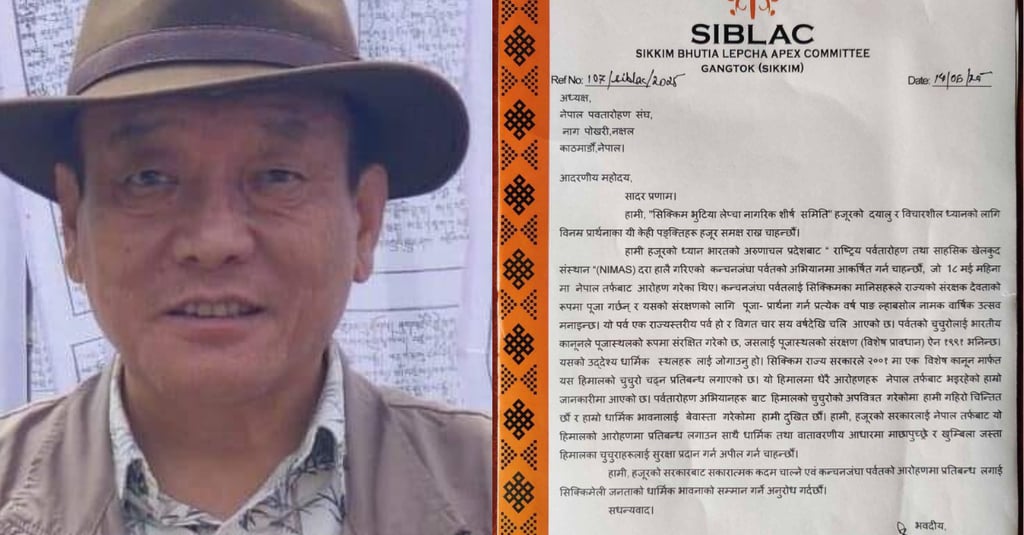SIBLAC appeals to Nepal to ban expeditions to Mt. KhangchenDzonga, cites sacred significance
The committee also drew attention to other sacred peaks in Nepal, such as Machhapuchhre and Khumbila, where climbing has been restricted due to cultural and spiritual concerns.
LOCAL


The Sikkim Bhutia Lepcha Apex Committee (SIBLAC) has formally urged the Government of Nepal and the Nepal Mountaineering Association to impose a ban on all mountaineering expeditions to Mt. KhangchenDzonga from the Nepal side. The appeal, dated June 14, 2025, highlights the deep spiritual and cultural significance the sacred mountain holds for the people of Sikkim and calls for respect and protection of religious sentiments.
In a letter addressed to Nepal's Minister for Culture, Tourism and Civil Aviation, Shri Badri Pandey, and the President of the Nepal Mountaineering Association, SIBLAC Convener Tseten Tashi Bhutia expressed concern over a recent expedition by the National Institute of Mountaineering and Adventure Sports (NIMAS), Arunachal Pradesh, which climbed Mt. Kanchenjunga from Nepal in May 2025.
SIBLAC pointed out that the mountain, regarded as the guardian deity of Sikkim, is a sacred peak where no human should tread. The people of Sikkim celebrate Pang Lhabsol annually to honour and seek blessings from the mountain. “Mt. KhangchenDzonga is not just a mountain for us, but a divine protector. We worship it with great reverence and expect others to respect its sanctity as well,” the letter stated.
Referring to India’s Places of Worship (Special Provisions) Act, 1991, and a 2009 law passed by the Government of Sikkim, which officially banned any climbing activity on the peak, SIBLAC appealed for Nepal to adopt a similar approach. “The expeditions from the Nepal side not only hurt our religious beliefs but also disturb the ecological and spiritual balance of the region,” the letter explained.
The committee also drew attention to other sacred peaks in Nepal, such as Machhapuchhre and Khumbila, where climbing has been restricted due to cultural and spiritual concerns. SIBLAC hopes similar recognition will be extended to Mt. KhangchenDzonga.
SIBLAC’s call comes amidst rising concerns from indigenous communities across the eastern Himalayas about the spiritual erosion and environmental impacts of commercial expeditions on sacred peaks. While mountaineering remains a significant source of tourism revenue for Nepal, voices advocating for cultural and spiritual conservation are growing louder.
The committee in its appeal said, “We trust the Nepalese government and mountaineering authorities will take this appeal in the right spirit and preserve the dignity of Mt. KhangchenDzonga as a sacred peak.”
